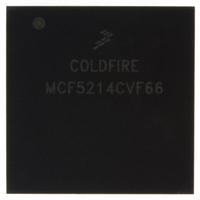MCF5214CVF66 Freescale Semiconductor, MCF5214CVF66 Datasheet - Page 67

MCF5214CVF66
Manufacturer Part Number
MCF5214CVF66
Description
IC MPU 32BIT COLDF 256-MAPBGA
Manufacturer
Freescale Semiconductor
Series
MCF521xr
Datasheet
1.MCF5216CVM66J.pdf
(766 pages)
Specifications of MCF5214CVF66
Core Processor
Coldfire V2
Core Size
32-Bit
Speed
66MHz
Connectivity
CAN, EBI/EMI, I²C, SPI, UART/USART
Peripherals
DMA, LVD, POR, PWM, WDT
Number Of I /o
142
Program Memory Size
256KB (256K x 8)
Program Memory Type
FLASH
Ram Size
64K x 8
Voltage - Supply (vcc/vdd)
2.7 V ~ 3.6 V
Data Converters
A/D 8x12b
Oscillator Type
Internal
Operating Temperature
-40°C ~ 85°C
Package / Case
256-MAPBGA
Package
256MA-BGA
Device Core
ColdFire
Family Name
MCF521x
Maximum Speed
66 MHz
Operating Supply Voltage
3.3 V
Data Bus Width
32 Bit
Number Of Programmable I/os
142
Interface Type
QSPI/UART/I2C/CAN
On-chip Adc
8-chx10-bit
Number Of Timers
8
Lead Free Status / RoHS Status
Contains lead / RoHS non-compliant
Eeprom Size
-
Available stocks
Company
Part Number
Manufacturer
Quantity
Price
Company:
Part Number:
MCF5214CVF66
Manufacturer:
Freescale Semiconductor
Quantity:
10 000
Company:
Part Number:
MCF5214CVF66J
Manufacturer:
Freescale Semiconductor
Quantity:
10 000
- Current page: 67 of 766
- Download datasheet (9Mb)
If the processor is not in trace mode and executes a stop instruction where the immediate operand sets
SR[T], hardware loads the SR and generates a trace exception. The PC in the exception stack frame points
to the instruction after the stop, and the SR reflects the value loaded in step 2.
Because ColdFire processors do not support any hardware stacking of multiple exceptions, it is the
responsibility of the operating system to check for trace mode after processing other exception types. As
an example, consider a TRAP instruction execution while in trace mode. The processor initiates the trap
exception and then passes control to the corresponding handler. If the system requires that a trace exception
be processed, it is the responsibility of the trap exception handler to check for this condition (SR[T] in the
exception stack frame set) and pass control to the trace handler before returning from the original
exception.
2.3.4.7
A line-A opcode is defined when bits 15-12 of the opword are 0b1010. This exception is generated by the
attempted execution of an undefined line-A opcode.
2.3.4.8
A line-F opcode is defined when bits 15-12 of the opword are 0b1111. This exception is generated when
attempting to execute an undefined line-F opcode.
2.3.4.9
See
response to a hardware breakpoint register trigger. The processor does not generate an IACK cycle, but
rather calculates the vector number internally (vector number 12). Additionally, SR[M,I] are unaffected by
the interrupt.
2.3.4.10
When an RTE instruction is executed, the processor first examines the 4-bit format field to validate the
frame type. For a ColdFire core, any attempted RTE execution (where the format is not equal to {4,5,6,7})
generates a format error. The exception stack frame for the format error is created without disturbing the
original RTE frame and the stacked PC pointing to the RTE instruction.
The selection of the format value provides some limited debug support for porting code from M68000
applications. On M68000 family processors, the SR was located at the top of the stack. On those
processors, bit 30 of the longword addressed by the system stack pointer is typically zero. Thus, if an RTE
is attempted using this old format, it generates a format error on a ColdFire processor.
If the format field defines a valid type, the processor: (1) reloads the SR operand, (2) fetches the second
longword operand, (3) adjusts the stack pointer by adding the format value to the auto-incremented address
after the fetch of the first longword, and then (4) transfers control to the instruction address defined by the
second longword operand within the stack frame.
Freescale Semiconductor
3. The processor then generates a trace exception. The PC in the exception stack frame points to the
Chapter 30, “Debug Support,”
instruction after the stop, and the SR reflects the value loaded in the previous step.
Unimplemented Line-A Opcode
Unimplemented Line-F Opcode
Debug Interrupt
RTE and Format Error Exception
MCF5282 and MCF5216 ColdFire Microcontroller User’s Manual, Rev. 3
for a detailed explanation of this exception, which is generated in
ColdFire Core
2-21
Related parts for MCF5214CVF66
Image
Part Number
Description
Manufacturer
Datasheet
Request
R
Part Number:
Description:
Manufacturer:
Freescale Semiconductor, Inc
Datasheet:
Part Number:
Description:
Manufacturer:
Freescale Semiconductor, Inc
Datasheet:
Part Number:
Description:
Manufacturer:
Freescale Semiconductor, Inc
Datasheet:
Part Number:
Description:
Manufacturer:
Freescale Semiconductor, Inc
Datasheet:
Part Number:
Description:
Manufacturer:
Freescale Semiconductor, Inc
Datasheet:
Part Number:
Description:
Manufacturer:
Freescale Semiconductor, Inc
Datasheet:
Part Number:
Description:
Manufacturer:
Freescale Semiconductor, Inc
Datasheet:
Part Number:
Description:
Manufacturer:
Freescale Semiconductor, Inc
Datasheet:
Part Number:
Description:
Manufacturer:
Freescale Semiconductor, Inc
Datasheet:
Part Number:
Description:
Manufacturer:
Freescale Semiconductor, Inc
Datasheet:
Part Number:
Description:
Manufacturer:
Freescale Semiconductor, Inc
Datasheet:
Part Number:
Description:
Manufacturer:
Freescale Semiconductor, Inc
Datasheet:
Part Number:
Description:
Manufacturer:
Freescale Semiconductor, Inc
Datasheet:
Part Number:
Description:
Manufacturer:
Freescale Semiconductor, Inc
Datasheet:
Part Number:
Description:
Manufacturer:
Freescale Semiconductor, Inc
Datasheet:











